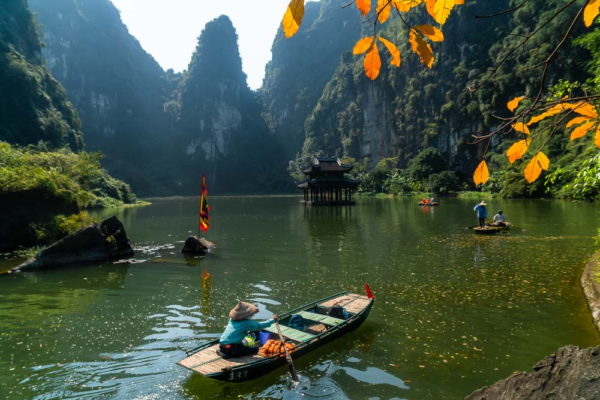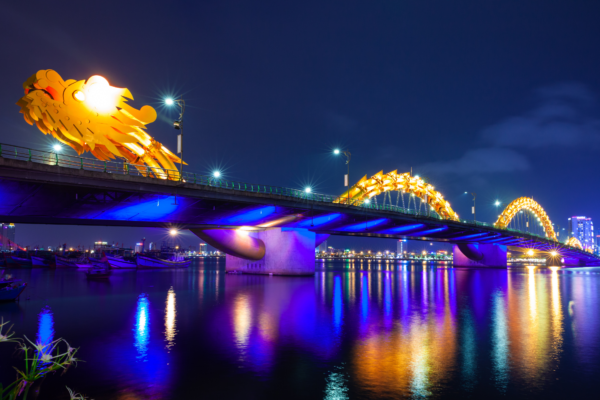As the sun peeks over the horizon, casting a golden glow across the murky waters of the Mekong River, I find myself aboard a small wooden boat, eagerly anticipating the day ahead. Today, I’m embarking on a journey to explore one of Vietnam’s most iconic attractions: the Mekong Delta floating market. This unique experience promises to be a feast for the senses and a window into the heart of Vietnamese culture.
The Rhythm of River Life | Mekong Delta Floating Market
Our journey begins in Can Tho, the largest city in the Mekong Delta region. As we set off from the bustling pier, the cacophony of city life gradually fades, replaced by the gentle lapping of water against our boat’s hull. Our guide, a local named Minh, explains that we’re heading to Cai Rang, the largest and most famous of the Mekong Delta floating markets.

As we cruise along, I’m struck by the sheer number of vessels on the water. From tiny sampans to larger barges, the river is a highway of commerce and daily life. Minh points out families going about their morning routines on houseboats, children in school uniforms being ferried to shore, and farmers transporting their produce to market.
Tip: To truly experience the market at its liveliest, aim to arrive before 7 AM. This means an early start, but the spectacle is well worth the lost sleep.
Cai Rang: A Floating Bazaar
As we approach Cai Rang, the number of boats increases dramatically. Suddenly, we’re in the midst of a vibrant, floating bazaar. The air is filled with a symphony of voices calling out their wares, the aroma of fresh produce, and the pungent scent of fish sauce.
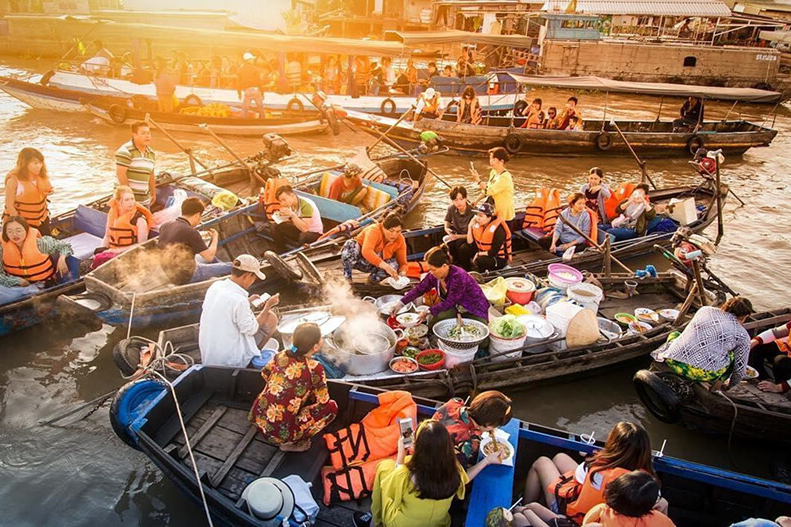
One of the most fascinating aspects of the market is the innovative way vendors advertise their goods. Each boat has a long pole attached to its bow, from which hangs a sample of whatever they’re selling. Pineapples, watermelons, squash, and even enormous jackfruit dangle above the water, creating a colorful display that’s both practical and visually striking.
Minh encourages me to try my hand at bartering, a crucial skill in Vietnamese markets. I nervously approach a boat laden with mangoes, gesturing at the fruit and holding up some dong. The vendor, an elderly woman with a wide smile, patiently helps me through the transaction. I walk away with a bag of the sweetest mangoes I’ve ever tasted and a sense of accomplishment.
Tip: Bring small denominations of Vietnamese dong for easier transactions. While some vendors may accept US dollars, using local currency is appreciated and often results in better prices.
Beyond Produce: The Heart of Mekong Culture | Mekong Delta Floating Market
While fruits and vegetables dominate the market, Cai Rang offers much more than just produce. As we weave through the maze of boats, I spot vendors selling everything from household goods to traditional medicines. One boat catches my eye, piled high with conical nón lá hats, an iconic symbol of Vietnam.
But it’s not just about buying and selling. The floating market is a social hub, a place where people come to gossip, share news, and strengthen community bonds. We pass boats where friends are sharing cups of strong Vietnamese coffee, their laughter carrying across the water.
Minh suggests we stop at one of the floating cafes for breakfast. As our boat sidles up to a larger vessel, the enticing aroma of phở fills the air. We’re served steaming bowls of the iconic Vietnamese soup, along with bánh mì sandwiches. Eating breakfast while gently bobbing on the river, surrounded by the bustle of the market, is an experience I’ll never forget.
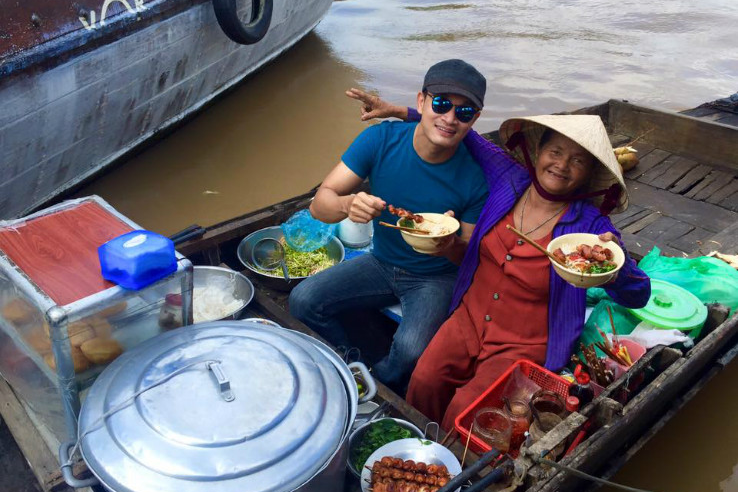
Tip: Don’t miss the chance to try local specialties at the floating cafes. The food is fresh, delicious, and offers a true taste of Mekong Delta cuisine.
Beyond Cai Rang: Exploring Smaller Markets
While Cai Rang is undoubtedly the star attraction, Minh suggests we visit some smaller, less touristy markets to get a more authentic glimpse of local life. We head to Phong Dien, a smaller floating market about 20 kilometers from Can Tho.
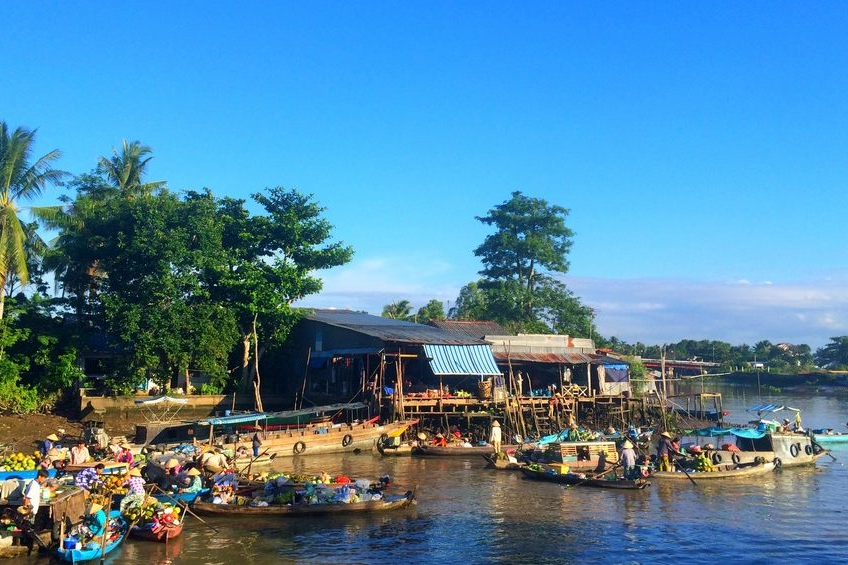
The difference is immediately apparent. Here, there are fewer tourist boats and more local traders. The atmosphere is more relaxed, and I feel less like an observer and more like a participant in daily Mekong life. We watch as farmers exchange goods, haggling good-naturedly over prices.
One particularly memorable moment comes when we encounter a boat selling traditional rice paper. The vendor demonstrates the art of making bánh tráng, spreading a thin layer of rice batter on a cloth stretched over steaming water. It’s a mesmerizing process, and I leave with a package of freshly made rice paper, eager to try my hand at spring rolls back home.
Tip: Consider booking a multi-day tour to explore some of the smaller, more remote floating markets. While they may lack the scale of Cai Rang, they offer a more intimate and authentic experience.
Preserving a Way of Life | Mekong Delta Floating Market
As our day on the Mekong draws to a close, I reflect on the experience. These floating markets are more than just tourist attractions; they’re a vital part of the region’s economy and cultural heritage. However, Minh explains that they face challenges from modernization and changing consumer habits.
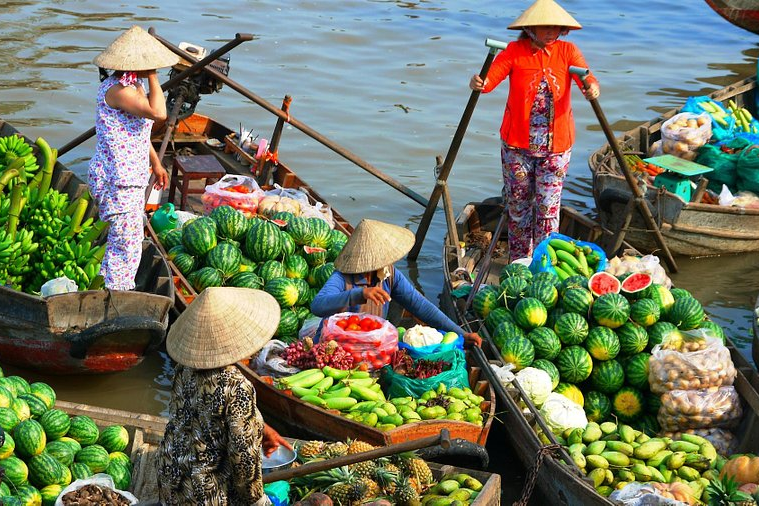
Efforts are underway to preserve this unique way of life. Some markets have introduced nighttime sessions to attract more visitors, while others are focusing on promoting traditional crafts and foods. As travelers, we can support these initiatives by visiting responsibly, respecting local customs, and appreciating the cultural significance of what we’re experiencing.
As we dock back in Can Tho, I’m left with a profound appreciation for the resilience and ingenuity of the Mekong Delta’s people. The floating markets are a testament to their ability to adapt and thrive in a challenging environment, creating a way of life that’s both practical and beautifully unique.
Conclusion
For those seeking an authentic cultural experience that engages all the senses, the Mekong Delta floating markets are an absolute must-visit. They offer a window into a way of life that’s rapidly changing, yet still deeply rooted in tradition. It’s an adventure that will leave you with lasting memories and a deeper understanding of Vietnam’s rich cultural tapestry.
Ready to explore more unique destinations? Visit Findtourgo for inspiration on your next adventure.


